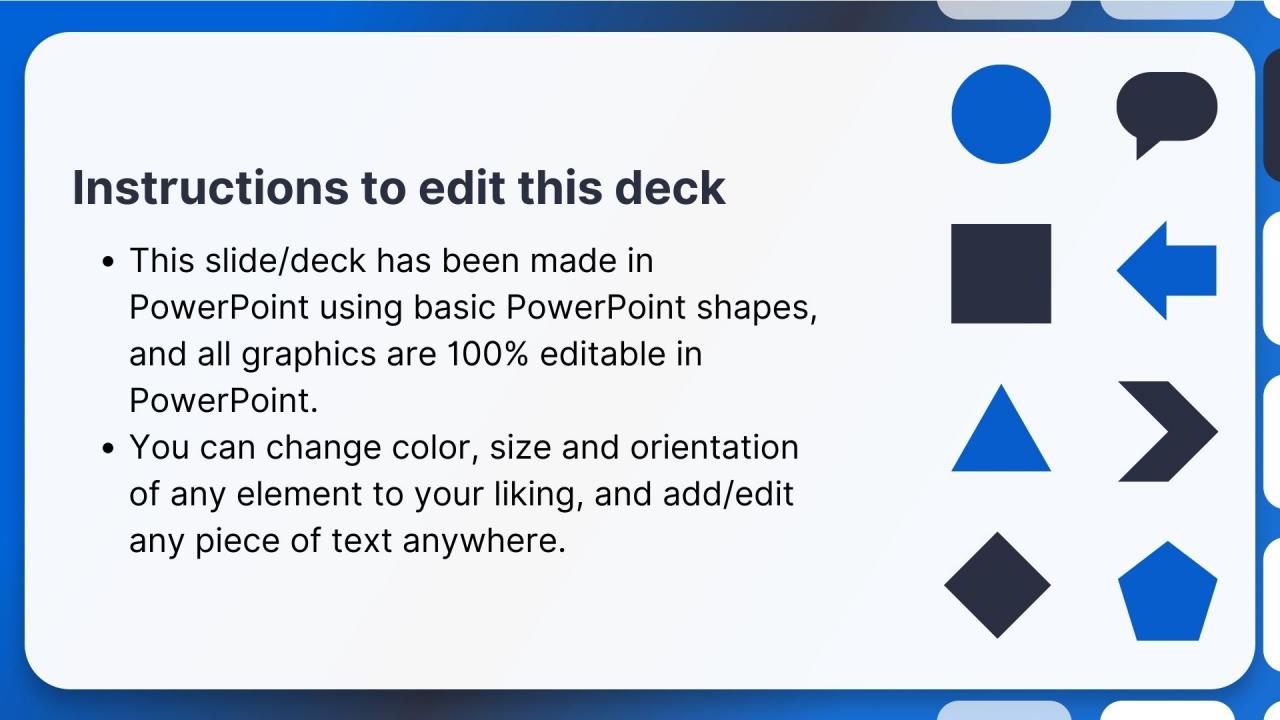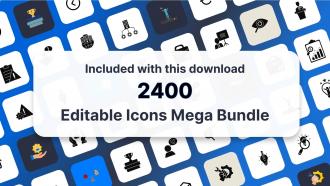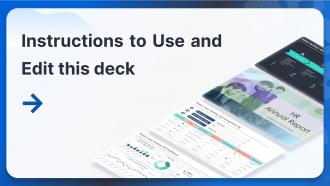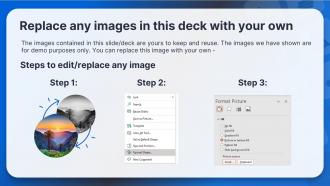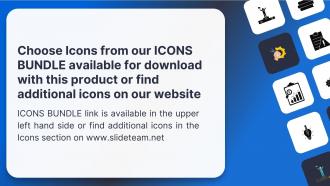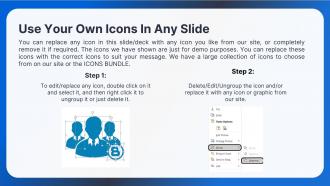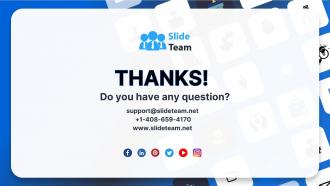Overview Of Hospitality Industry Training Ppt
This PPT Training Module on Overview of Hospitality Industry is an essential toolkit for those interested in understanding the hospitality sector. It begins by clarifying hospitality concepts, followed by a distinction between hotel and hospitality management, laying the foundation for deeper insights. The PowerPoint Deck then covers the scope and key characteristics of the hospitality industry. A pivotal section on emerging trends highlights the digital transformation within the industry, showcasing advancements like smart rooms, AI, VR, cyber security, and blockchain solutions. It concludes with industry statistics, key takeaways, and discussion questions to equip learners with a comprehensive understanding of the hospitality industrys current landscape and future directions.
You must be logged in to download this presentation.
 Impress your
Impress your audience
Editable
of Time
PowerPoint presentation slides
Presenting Training Deck on Overview of Hospitality Industry. This deck comprises of 20 slides. Each slide is well crafted and designed by our PowerPoint experts. This PPT presentation is thoroughly researched by the experts, and every slide consists of appropriate content. All slides are customizable. You can add or delete the content as per your need. Not just this, you can also make the required changes in the charts and graphs. Download this professionally designed business presentation, add your content, and present it with confidence.
People who downloaded this PowerPoint presentation also viewed the following :
Content of this Powerpoint Presentation
Slide 3
This slide covers the meaning of hospitality. Since, the reception of guests is fundamental in hospitality, the hotels need to keep up with the latest trends, use the most up-to-date technology, and deliver fabulous customer service.
Slide 4
This slide tabulates the differences between hotel and hospitality management. The comparison factors are the area of work, employment sectors, and the factor driving each.
Slide 5
This slide provides information about the scope of hospitality industry which includes food services, accommodations, entertainment, and travel services.
Instructor’s Notes:
The scope of hospitality industry is as follows:
- Food Services: Hotels compete to provide the best customer experience with quality food and beverages. It is offered through cafés, restaurants, pubs and bars, nightclubs, and tea and coffee shops
- Accommodations: The purpose of accommodation is to provide a safe and secure place for people to stay. These range from affordable small establishments (such as motels and lodges) to expensive and luxurious properties (villas, cottages, etc.)
- Entertainment: Entertainment covers everything from music concerts, art and performance, museums, theme parks, sporting events, escape rooms, and cultural events that enable people to take part in recreational activities for hobby, cultural and educational purposes
- Travel Services: Travel and tourism provide means of transport to move travelers from one place to another. It includes travel agents, logistics companies, sightseeing, bus and walking tours, airlines, taxis, and car rentals
Slide 6
This slide showcases the characteristics of hospitality industry which are intangibility, inseparability, variability, perishability, fixed supply, and seasonality.
Instructor’s Notes:
The characteristics of hospitality industry are:
- Intangibility: A service can only be experienced and felt by the guest. Intangibility reflects in personalized service etiquette, conversation, quality of services, friendly environment as well as the quality of products being offered to the guests
- Inseparability: The service is inseparable from the service provider. Hence, the staff possesses high level of skill in handling supplies as part of their job to provide service. This is because services are produced and consumed simultaneously
- Variability: Variability represents the idea that the same service will provide a different level of satisfaction to different guests at different times. This leads to varied experiences. The quality of services depends on what and how the hotel serves
- Perishability: Services in the hospitality industry have a time frame for utilization. Unused service today will perish and cannot be sold or used the next day. Like, a ticket for the evening show of a movie cannot be used for watching the night show
- High Operating Costs: In the hospitality industry, the total cost is quite high, and the profit margin is low and the businesses are bound to operate on narrow margin.
- Seasonality: Hospitality industry demand fluctuates due to weather changes and holidays throughout the year
- Heterogeneity: Guests have innumerable options to choose from, as the system of products and services offered varies significantly on variables such as, the methods of preparation, the service staff, complimentary items offered, etc.
- Labor Intensive: Since the hospitality industry is service-oriented, it requires a vast labor supply, especially for hotels that aim to provide premium service to guests. Not only the demand for labor is high, but the hotels are also willing to spend resources and time on training and recruiting candidates
Slide 7
This slide highlights the emerging trends in hospitality industry which are solo travelling, minimalism and simplicity, bleisure and workcations, and holistic hospitality and wellbeing.
Instructor’s Notes:
The emerging trends in hospitality industry are as follows:
- Solo Travelling: People these days want to explore the world, socialize, and prefer to spend time with themselves. Solo travelers comprise 10% of the market, which can prove to be an opportunity for the hospitality industry
- Minimalism and Simplicity: Less clutter and simplicity creates a calm and relaxing atmosphere which makes the guest stay for long. For instance, plants added with plain walls help one reunite with nature and feel refreshed
- Bleisure and Workcations: The 'work from home' culture intensified bleisure travel, where an employee travels for work and leisure. Millennials and Gen Z are more inclined towards bleisure compared to their older counterparts. To accommodate hybrid travel in hospitality, hotels can create business-centric resources like high-speed data and private work pods
- Holistic Hospitality: After COVID-19, there has been a boom in self-care and wellness. Upgrading health and wellness elements in the hotel, using eco-friendly cutlery, creating sustainable architecture including healthy food options, and improving lighting and ventilation are some facilities which are gaining popularity
Slide 8
This slide highlights emerging digitalization trends in the hospitality industry which are smart rooms, artificial intelligence, virtual reality, cyber security, blockchain solutions.
Instructor’s Notes:
The emerging trends in hospitality industry are as follows:
- Smart Rooms: Smart hotel might make use of the Internet of Things (IoT) which enables controlling each room as a separate room through an internet-enabled HVAC (heating, ventilation and air-conditioning) system. The guests may also have the option of using technology, such as phone apps or voice control, to make it simpler for them to manage the temperature in the room, the lighting, and the entertainment systems
- Artificial Intelligence: With the help of Artificial Intelligence, hotels are able to increase personalization to tailor recommendations according to customers' preferences. In-person customer service with the help of robots, chatbots, and messaging allows customers to seek instant responses
- Virtual Reality: Virtual reality aids a hotel in making their guests experience and explore things rather than just reading descriptions. This can be done via virtual hotel tours using a VR headset where they can take a look at their hotel room before they book it. The surroundings may be enhanced with graphical or informative overlays using augmented reality
- Cyber Security: Loss of private data such as clients' payment details, and managers' information could lead to a crash in workflow. Hotels need to inculcate modern hospitality apps that deal with safe storage of client information and payment details, ensuring that it's backed up and recoverable. Leaving such data vulnerable to cyber-attacks is a big no, or the establishment runs the risk of being driven out of business
- Blockchain Solutions: Blockchain allows crypto currencies as a payment option at a hotel; this is a service that is increasingly becoming common at branches of luxury hotel groups
Slide 9
This slide highlights the prevailing digitalization trend of smart rooms in hospitality industry. A smart room makes use of Internet of Things to link and transfer data among internet systems and networks via web-enabled smart devices that use sensors, software, processors, etc.
Instructor’s Notes:
A hotel room can be transformed into a smart room by:
- Key Card Integration: Key card integrations allow unlocking of doors from smart phones and provides access to hotel facilities as and when required without the 24-hour presence of staff
- Voice Technology: A voice-controlled system enables guests to regulate lights, music, television in hotel room with the help of voice commands
- Personalized Room Controls: With the help of technology, guests would be able to adjust the lighting, water temperature, and set the ideal room temperature even before they arrive
- Interactive Walls and Mirrors: Smart rooms could contain digital mirrors which can tell the restaurant hours, the weather, places to go for dinner, etc. Likewise, interactive walls could help with things like traffic, tourist attractions, show maps in real-time, and a lot more
Slide 10
This slide represents use of Artificial Intelligence in hospitality industry. It can be used to enhance user experience by delivering personalized services and offering virtual assistance.
Instructor’s Notes:
Artificial Intelligence (AI) usability in hospitality industry:
- Chatbots: Chatbots facilitate instant responses to frequently asked questions. For example, information about areas of the hotel, etc. They are programmed to speak a variety of languages and adapt according to the audience. Also, such technology proves more appealing to the guests and makes one less dependent on hiring multilingual staff
- Data Analysis: Technology helps in conducting data analysis where it can be quickly sorted, analyzed, and interpreted. It allows the hotel to focus on the target audience and formulate strategies to attract them
Slide 11
This slide represents the use of virtual reality in the hospitality industry. It can be used for virtual hotel tours, virtual booking processes, and ease in planning and management.
Instructor’s Notes:
Virtual reality can be made use of in the following manner:
- Virtual Hotel Tours: With virtual reality, customers can now visit the hotel and take a glance at their hotel room or any other areas of the hotel. They need not go through website images or searches when they can experience the 360-degree view using a VR headset
- Virtual Booking Process: Using virtual reality headset, potential guests can have virtual tours of hotel rooms. This enables them to compare rooms, and makes the booking process much simpler, effective and cheaper
- Ease in Planning and Management: Guests can have the opportunity to experience a bird's eye view of their destination and navigate tourist destinations and attractions, virtually. The VR headset might also help connect with other travelers who have VR hardware and exchange feedback
Slide 12
This slide showcases how cybercrime has become a major concern in the hospitality industry. A cyber-attack can not only pose a major threat of losing crucial data but also loss of revenue due to penalties and lawsuits. Moreover, there could be a decline in brand value, share value, and loss of goodwill.
Instructor’s Notes:
The main risks associated with cyber-crimes in the hospitality industry are:
- Phishing Attacks: The term phishing means sending or receiving impersonated emails that aim to trick the victim and push them to reveal sensitive information such as log-in details, credit/debit card details, passwords etc.
- Ransomware Attacks: Ransomware is a malware that threatens to publish data if the victims fail to pay to have the data restored. Machines are infected with a virus that encrypts the data
- Dark Hotel Hacking Method: Dark hotel hackers first gain access to a hotel's Wi-Fi system, then, by forging digital certificates, convinces victims to download that software and peeps into their private information. This is specifically done to target high-profile guests
Slide 13
This slide highlights how blockchain can be put into use in the hospitality industry. It consists of digital records, where transactions, once recorded, are quite difficult to amend as the data is secured using cryptography
Instructor’s Notes:
Ways by which blockchain can be used in the hospitality industry are:
- Secure Payments: Associated costs for hotels can be reduced, and bank payments can be streamlined with the acceptance of cryptocurrencies as a payment mechanism
- ID and Security: The ID of guests is required at various stages of their journey, but blockchain could potentially allow for a shared digital database. With the help of that, for example, passengers could just provide a fingerprint to quickly verify their identity and proceed with their tasks
- Baggage Tracking: A guest's luggage changes hands many times over the course of their journey, which can result in logistical problems. Blockchain can allow companies to easily share and access related data, which will help track the luggage
Slide 14
This slide showcases the market size, the leading hotel companies by market value worldwide and the factors that affects booking decisions in hospitality industry.
Slide 15
This slide showcases the worth of hotel and motel industry in the US, the number of jobs the hospitality sector could have created in 2022, and the rising demand for digital customer experience from hotels brands.
Slide 16
This slide highlights the key takeaways from the session on introduction to hospitality. The trainer can use this to highlight essential learnings from the session.
Slide 32 to 47
These slides contain energizer activities to engage the audience of the training session.
Slide 48 to 75
These slides contain a training proposal covering what the company providing corporate training can accomplish for the client.
Slide 76 to 78
These slides include a training evaluation form for instructor, content and course assessment.
Overview Of Hospitality Industry Training Ppt with all 87 slides:
Use our Overview Of Hospitality Industry Training Ppt to effectively help you save your valuable time. They are readymade to fit into any presentation structure.
-
They saved me a lot of time because they had exactly what I was looking for. Couldn’t be happier!
-
A perfect platform for all your presentation needs. Unlimited products at an affordable price.




















































































